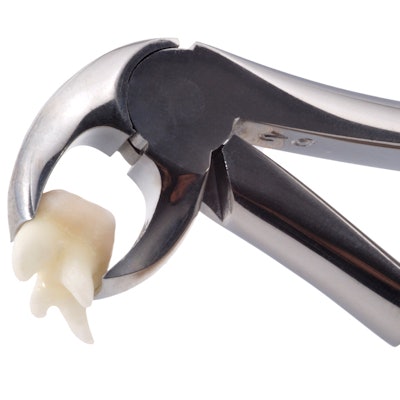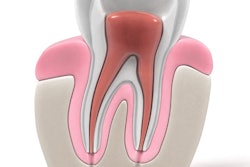
A dissertation by a Swedish dentist and researcher raised concerns about potential complications of root canal treatment performed by general dental practitioners. The research involved five studies with hundreds of dental patients at Swedish public dental clinics.
A total of 30% of patients failed to complete root canal treatment, often because the tooth needed to be extracted instead. What's worse, half of patients who completed treatment reported pain or discomfort one year later.
 Dr. Emma Wigsten.
Dr. Emma Wigsten."This raises questions about the need for postgraduate education and critical review of the organization of care, in view of the complexity of the treatment," wrote author Dr. Emma Wigsten in her doctoral thesis. Wigsten, a doctoral candidate in the endodontics department at the University of Gothenburg in Sweden, defended her thesis on October 15.
Wigsten undertook a series of studies to gain a better understanding of the role of root canal treatment in general dental care. Few studies specifically investigate endodontic outcomes in general practice, and no prior studies have monitored outcomes from the first appointment to completed filling, Wigsten noted.
Her research included patients of public dental clinics in the Swedish region of Västra Götaland, which has more than 1.7 million residents. The public clinics serve 40% of the population.
Most of the studies focused on a cohort of 243 patients who started root canal treatment at one of the region's 20 public dental clinics within a two-month time period. At their first appointment, nearly two-thirds of patients were symptomatic and had recorded caries. Nearly all of the teeth scheduled for endodontic treatment had been previously filled, and half were molars.
One year later, 70% of patients had completed their root canal treatment, but 16% had not yet completed treatment and 13% needed an extraction instead. It took general dentists 2.4 appointments, on average, to complete the root canal treatment.
Molars had the least favorable outcomes for endodontic treatment performed by the general dentists. Compared with other types of teeth, molars were more likely to be extracted, had higher complication rates, and needed more appointments for completion.
"It seems harder to get a good result in treating the molars, despite time and resources invested," Wigsten stated in a press release. "You're working inside the tooth where you can't see anything, and the further back you go in the mouth, the more difficult it becomes."
Wigsten followed up with the same cohort of patients one to three years after their treatment. Half of the patients reported still experiencing pain or discomfort, although 87% of patients who completed treatment did not regret their choice.
It's unknown whether the results would have been different if endodontic specialists had performed the root canal treatment. However, the findings made Wigsten question if that may be the case. She pointed to a prior study conducted in the same region that found general dentists experienced high levels of anxiety, stress, and frustration when conducting root canal treatment.
"Root canal treatments of molars involve significantly bigger challenges than other tooth groups," Wigsten stated. "So it may be important to investigate whether root canal treatments of molars should be performed to a greater extent by dentists specializing in root canal treatment."



















